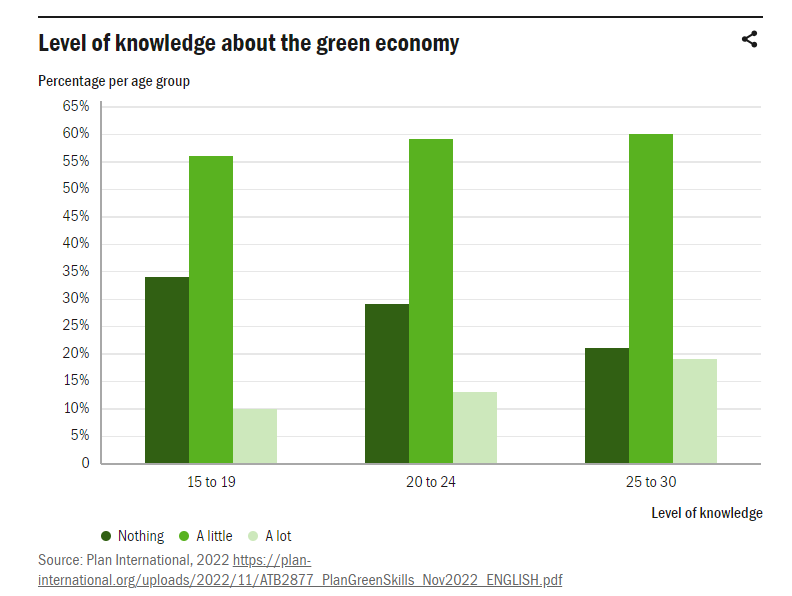Everyone is affected by environmental challenges, such as climate change, deforestation, pollution, and resource depletion, but young people are among the most vulnerable, especially during challenging times. The COVID-19 crisis, for example, exacerbated vulnerabilities for the approximately 55 million young individuals worldwide who were already living in extreme poverty. Environmental challenges are particularly worrying for those who rely heavily on natural resources and are predominantly engaged in agriculture and related sectors.
Addressing environmental issues requires collective efforts from all sectors of society, and the engagement of youth is crucial. Today’s young people have the potential to be agents of change and drive sustainable development.
This role has been recognized globally. The World Youth Report prepared by the UN Department of Economic and Social Affairs acknowledges that young people will be critical in sustainable development efforts at all levels, and explores how evidence-based youth policies can help accelerate youth-related objectives.
Young people have been instrumental in driving policies and practices around global sustainability, and education plays a vital role in equipping them with the knowledge and skills to make informed decisions regarding sustainability. However, acquiring the skills to actively participate in the transformation to greener economies can be a challenge for many young people.
Fostering skills development
A global survey found that less than one in three young people (29%) aged 15 to 30 feel competent in the skills they believe are needed to do jobs that tackle climate change, with young women feeling less competent than young men. Additionally, the survey revealed that only 14% of all respondents expressed a high level of knowledge about the green economy.
Another survey was conducted by UNIDO’s Learning and Knowledge Development Facility (LKDF) to investigated stakeholders’ views on sustainability education in industrializing countries. Respondents from diverse backgrounds and industries were unanimous: the cultivation of sustainability skills is crucial for realizing sustainable development goals and propelling robust economic growth. Furthermore, a paper prepared by the LKDF on Green Industrial Skills for Sustainable Future concluded that skills development programs most effective when goals and interventions are closely coordinated across sectors and stakeholders. Partnerships are key for building and implementing such programs.
As defined by the Sustainable Development Goal 17 (SDG17), strengthening global partnerships is key for sustainable development and meeting the Global Goals. Collaboration and partnerships play a pivotal role in equipping young people with the necessary skills to thrive in the modern workforce. The International Labour Organization (ILO) estimated that approximately 73 million young people were unemployed worldwide in 2022, many of whom lack the skills required to meet the demands of the job market. This alarming statistic underscores the urgent need to bridge the skills gap.
Related Articles: Africa’s Agribusiness Sector to Reach US$1 Trillion by 2030: What Role Does the Youth Play? | Developing Resilience in Skills: Overcoming Challenges and Building Back Better for the Future | The Future Is in Youth’s Hands: New Skills Needed for the Green Transition
Governments, educational institutions and the private sector need to collaborate more to design vocational training, apprenticeships and entrepreneurship support. These programs should be aligned with industry needs and actively promoted and supported by relevant stakeholders. By combining resources, expertise and insights, these alliances can effectively equip young people with the sustainability skills demanded by the job market.
Research has found that a combination of classroom‐based technical training and practical experience, for example through apprenticeships, can improve the supply of skilled labour for employers while enhancing workers’ incomes. This emphasizes that collaboration between education and private sectors is crucial for greater employability in the green economy. Such partnerships not only bridge the skills gap, but also create a supportive ecosystem that nurtures the talent and potential of young people.
Building a sustainable future
Despite calls for greater inclusion in decision-making processes, young people often encounter barriers. In many countries, youth participation is impeded by the absence of legislative frameworks and national policies mandating youth engagement.
The United Nations Development Programme (UNDP) highlights the initial neglect of young people in previous Nationally Determined Contributions (NDCs). After submitting new or revised NDCs, 75% of Climate Promise countries now prioritize the inclusion of youth in the development of their NDCs. This is primarily achieved through consultations, awareness-raising efforts, and advocacy campaigns. It is imperative that young people secure a permanent presence within such arenas to ensure their effective contribution to national climate change policy and program development processes.
Final remarks
The youth are undoubtedly the ones who will bear the brunt of environmental degradation and climate change the most. They will experience the long-term consequences of unsustainable practices and a deteriorating environment, affecting their health, well-being, and overall quality of life.
Nevertheless, the youth are also powerful agents of change, who have a crucial role in achieving sustainability and creating a just, equitable and sustainable future for all. They possess the energy, innovative ideas and creativity necessary to develop practical solutions to present and future challenges. The private sector, governments and international organizations can support and empower young people by investing in opportunities that enable young people to lead the way.
— —
This article was originally published by the United Nations Industrial Development Organization (UNIDO) Industrial Analytics Platform (IAP) and is republished here as part of an editorial collaboration with UNIDO.
Editor’s Note: The opinions expressed here by the authors are their own, not those of Impakter.com — In the Featured Photo: Young woman participant in a skills development project in Ethiopia. Featured Photo Credit: MISALE/UNIDO.










